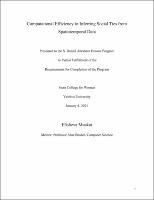Please use this identifier to cite or link to this item:
https://hdl.handle.net/20.500.12202/6579| Title: | Computational Efficiency in Inferring Social Ties from Spatiotemporal Data. |
| Authors: | Broder, Alan Muskat, Elisheva |
| Keywords: | spaciotemporal data social ties inference |
| Issue Date: | 4-Jan-2021 |
| Publisher: | New York, NY: Stern College for Women. Yeshiva University. |
| Citation: | Muskat, Elisheva. Computational Efficiency in Inferring Social Ties from Spatiotemporal Data Presented to the S. Daniel Abraham Honors Program in Partial Fulfillment of the Requirements for Completion of the Program Stern College for Women Yeshiva University January 4, 2021. New York, NY. Mentor: Professor Alan Broder, Computer Science. |
| Abstract: | The ability to infer social ties is useful for gaining insight into matters of social influence and the propagation of information. It is also useful in a variety of other fields, such as epidemiology, marketing, and criminology. With the increasing accessibility of GPS-enabled mobile devices and the growing popularity of location-based services, a new field of research regarding inferring real-world social ties from spatiotemporal data has emerged [1-4]. Proper attention to accuracy and efficiency in inferring social ties is essential for the technique to be useful in real-world scenarios. However, computational efficiency when computing co-occurrences based on massive amounts of spatiotemporal data, has been an often overlooked or understudied factor. This paper’s contribution is to survey prominent methods presented over the last two decades while analyzing how the method takes into account computational efficiency and, consequently, its usability with massive datasets. This survey then points the way towards fruitful areas for possible future research. |
| Description: | Senior honors thesis / Open Access |
| URI: | https://hdl.handle.net/20.500.12202/6579 |
| Appears in Collections: | S. Daniel Abraham Honors Student Theses |
Files in This Item:
| File | Description | Size | Format | |
|---|---|---|---|---|
| Elisheva Muskat OA Thesis 4Jan21 Comutational Efficiency in Inferring Social Ties from Spatiotemporal Data.pdf | 250.37 kB | Adobe PDF |  View/Open |
This item is licensed under a Creative Commons License

